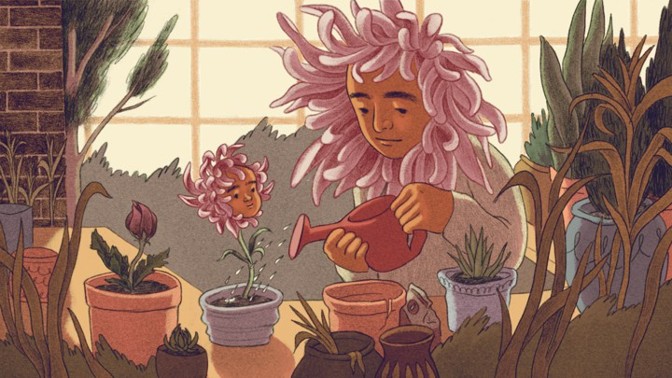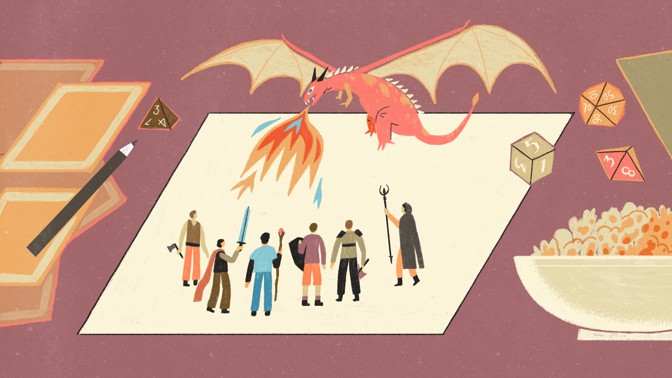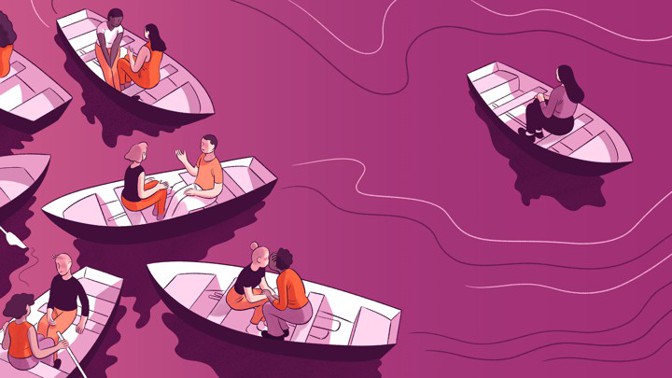

(Sarah Jung)
This Week in Family
“She looks just like her dad!” It’s a common refrain that new moms might hear after giving birth. But it turns out the resemblance is all in the eye of the beholder. Babies are equally likely to resemble either parent, but the myth persists because fathers are more likely to spend quality time with their infants if they think—egged on by family and friends—that the baby looks more like them. Where does that leave new mothers?
→ Read the rest
Highlights

(Wenjia Tang)
In this week’s installment of The Friendship Files, a group of friends talks about a game of Dungeons & Dragons that’s entered its third decade. They started playing together in high school, and have kept up two campaigns, with the same characters, ever since.
→ Read the rest
A rare genetic condition called Williams syndrome can leave children with learning difficulties, digestive issues, and cardiovascular problems—and almost no social anxiety. People with Williams can be hyper-social and have no concept of stranger danger. Trying to treat the physical issues related to the condition may also affect a person’s sunny disposition, leaving some to wonder what the true cost is.
→ Read the rest
Across the world, misunderstandings of what it means to have a non-binary body leave intersex people invisible or ignored by most, and sometimes uncomfortable under the broad umbrella of the LGBTQ community. In a new documentary premiering on the Atlantic, two filmmakers follow the story of one family in Zimbabwe navigating complicated gender politics.
→ Watch the film
Drama is brewing at Sidwell Friends School, an elite Washington, D.C., private school that counts presidents’ children among its alumni. But the students aren’t the ones causing trouble: Aggressive parents are recording meetings with counselors, verbally assaulting employees, and even spreading nasty rumors about other students at the school. Why have these parents gone wild? It always seems to come back to elite-college admissions.
Do you have experiences related to Sidwell Friends you want to share, or tips for our education reporter Adam Harris? Email him at aharris@theatlantic.com.
Dear Therapist

(Bianca Bagnarelli)
Every Monday, the psychotherapist Lori Gottlieb answers readers’ questions about life’s trials and tribulations, big or small, in The Atlantic’s “Dear Therapist” column. This week, someone writes in about the difficulties of being single and having to listen to friends talk—and complain—about their relationships.
Lori’s advice: The first step is recognizing that “ambiguous grief”—when someone feels a sense of loss over something that might have been—is real. This feeling is often invisible, so it merits a serious conversation with those around you:
Rather than taking breaks from [your friends] or biting your tongue during these conversations, you might find it beneficial to be more direct in sharing your experience with them. Your conversation might start like this: “I want to talk to you about something, because I really care about our friendship. I know that the problems you bring up about your relationship matter, but I don’t know if you realize what it’s like for me to hear them.”
Send Lori your questions at dear.therapist@theatlantic.com.

No comments:
Post a Comment